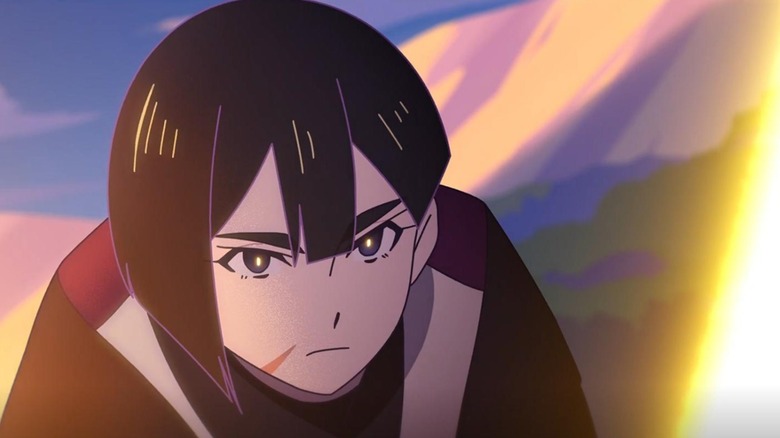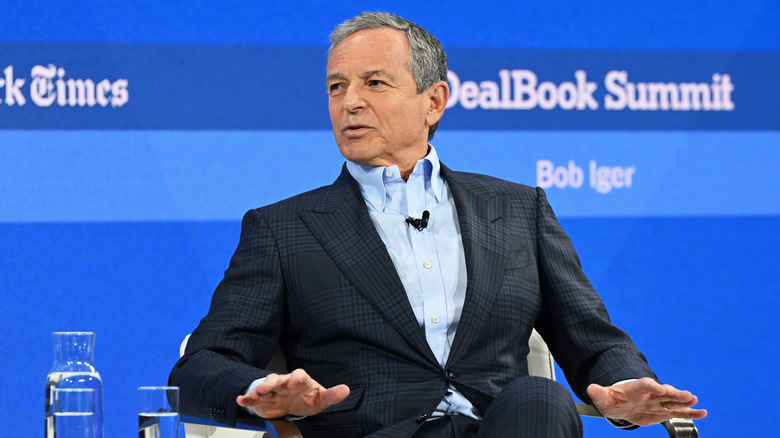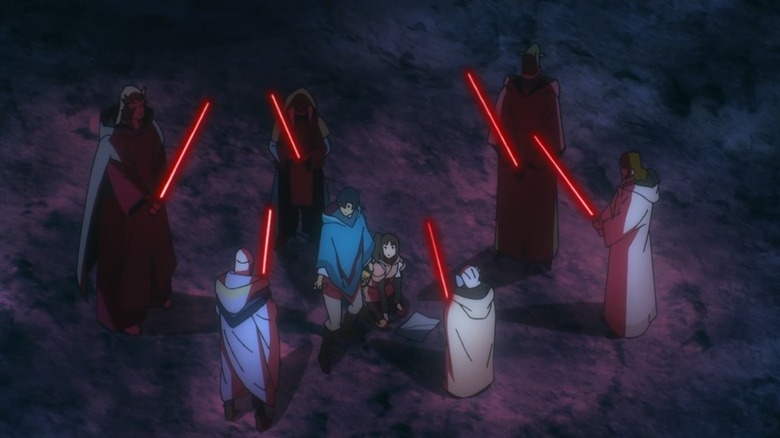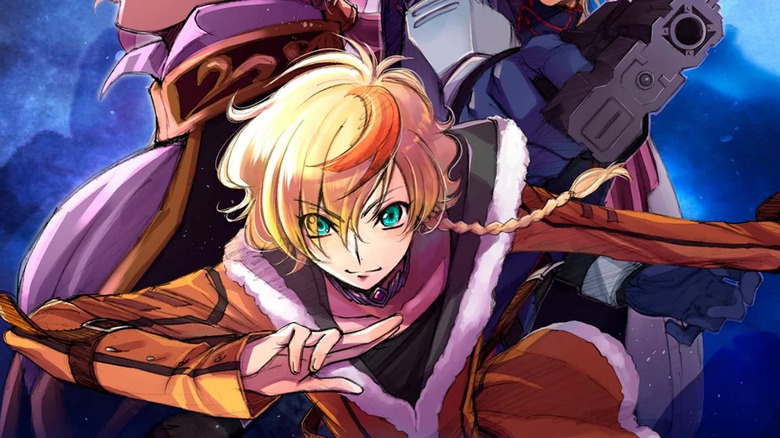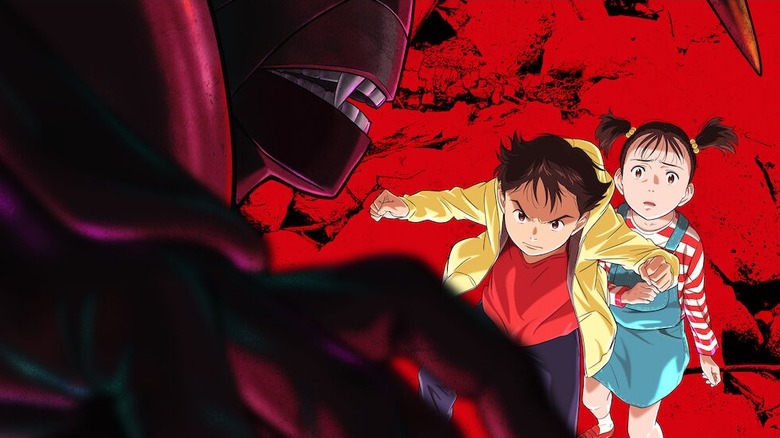After Gobbling Up Marvel And Star Wars, Disney Is Now Hungry For Anime
After a triumphant time in the 2010s, things are uncertain at the Walt Disney Company right now. With audience interest in the Marvel Cinematic Universe fading and "Star Wars" having become a primarily streaming franchise, there's a feeling that the company may have carelessly set fire to its money trees.
Disney's changing leadership suggests it won't be staying the course. In 2022, former Disney CEO Bob Iger resumed his post from Bob Chapek, a simultaneous vote of no confidence in his successor yet a stamp of approval for Iger's own tenure (he first served as Disney CEO from 2005 to 2020). Since his return, Iger has implicitly criticized Chapek's decision to go all-in on Disney+ originals, spreading the company's main offerings (Marvel and Pixar especially) too thin.
Another shake-up happened in February 2024, when Sean Bailey stepped down as president of Walt Disney Studios Motion Picture Production. His successor, David Greenbaum (formerly of Searchlight Pictures) has hinted at a restrained approach, with a creative ethos distilled to the question, "Does this movie need to exist?"
Iger has pushed back on the idea of "Marvel fatigue," but Disney's moves suggest he's keeping the company's options open. Said moves also suggest someone at Disney thinks there's room to grow in the animation market; not the American animation Disney built itself on, but imported anime. Aggressively seizing a nerdy niche gone mainstream? That sounds like classic Iger.
Bob Iger's reign at Disney
What was Iger's corporate strategy that made him feel like the safe choice for Disney shareholders? Expansions and acquisitions. In the late 1990s/early 2000s, Pixar was beating Disney at animation, the medium synonymous with the company since its founding. So, in 2006, Iger orchestrated Disney's acquisition of Pixar. In 2009, when the Marvel Cinematic Universe was first taking off, Iger smelled money there too and bought Marvel Entertainment. In 2012, Lucasfilm was his next target. It was basic but shrewd business; buy brands (like Pixar, Marvel superheroes, and "Star Wars"), with built-in audiences and you can reap the rewards without diluting your own identity. People still think of "The Avengers" as a Marvel movie more so than a Disney one.
In 2019, Iger's most ambitious acquisition was 20th Century Fox. While Marvel nerds mostly salivated at the thought of Marvel Studios owning the X-Men and Fantastic Four, reporting suggests Disney's primary goal was to gain Fox's near-century-deep library of movies to bulk up Disney+'s offerings and compete with Netflix.
This is not me worshipping at Iger's altar. His leadership of Disney may have been profitable, but it's a big reason why Hollywood currently serves as an IP recycling plant. He also shuttered Touchstone Pictures (Disney's label for adult dramas) in 2016, further depriving the industry of needed original films.
Plus, by relying only on blockbuster franchises to go big or go broke, Disney may have kneecapped itself.
Star Wars and Marvel falter
2018's "Solo: A Star Wars Story" became the first "Star Wars" movie to bomb at the box office (though the bloated production costs, thanks to replacing original directors Phil Lord & Chris Miller with Ron Howard, were a big part of that). You can draw a straight line from this to "Obi-Wan Kenobi" being turned from a movie into a Disney+ series. Now, as the streaming house of cards gets more wobbly every day, that's starting to feel like a mistake — and not just from a creative standpoint. I have no doubt that the "Star Wars" fans who grew up and adore the prequel trilogy would have come out to the theater for Ewan McGregor and Hayden Christensen's onscreen reunion as Kenobi and Vader.
"The Rise of Skywalker" passed $1 billion at the box office, but it was the lowest grossing of the sequel trilogy. Plus, did anyone come out of that one wanting to see more? So much for Disney's short-lived plans for one "Star Wars" movie every year, starting in 2015.
As for Marvel? "Avengers: Endgame" wrapped things up too well. Trying to recapture the capstone of a decade-plus-long excitement build-up is a fool's errand. (Disney really should have anticipated these diminishing returns by just looking at the comics industry, but I digress.) "Phase 4" of Marvel felt unfocused and passionless, with some of the movies finally getting failing scores from critics, and fans' falling enthusiasm has been evident at the box office. "The Marvels" (read our tepid review here) was the lowest-grossing MCU movie yet.
Why anime?
So, where does anime come in? Millennials, who will be the dominant generation (and consumers) sooner rather than later, are the first American generation who grew up with ease of access to anime. Many late '80s/'90s kids were raised on Toonami, a Cartoon Network block that programmed many anime series. These kids often count "Dragon Ball Z," "Cowboy Bebop," and anime-inspired works like "Avatar: The Last Airbender" as childhood favorites.
Getting into anime has been even easier for Gen Z, thanks to streaming (both legally and not-so-legally). Many anime are simulcast (i.e. you can watch them as soon as they air in Japan), and the English dubs turned around within weeks or months instead of years. The anime streaming site Crunchyroll (owned by Sony since 2017) has grown so big it swallowed up dubbing company Funimation.
A February 2021 report from Parrot Analytics found that the anime series "Attack on Titan" was the most popular show in the United States at the time. The growing fanbase for anime in the U.S. has also, invaluably, translated into box-office success. "Demon Slayer: Kimetsu no Yaiba—To the Hashira Training" has been one of 2024's early hits.
Disney enters the anime game
Anime isn't new territory for Disney. From 1996 to 2011, it was the primary U.S. distributor (and translator) of Studio Ghibli films. The anthology series "Star Wars: Visions" also recruited some of the top animation studios in Japan (including Production I.G. and Trigger). CartoonBrew reported in 2021 on anime series being added to Disney+ in Southeast Asia, suggesting that Disney saw anime as a useful tool for juicing subscriber sign-ups in the region. Anime's influence and audience extend outside its home markets, though.
The first sign Disney was going to be aggressive about anime titles came in 2022 when the company bought worldwide distribution rights to the long-awaited "Bleach: Thousand Year Blood War" anime (streaming on Hulu in the U.S. and Disney+ internationally). Disney reportedly outbid Crunchyroll, which was then streaming the original "Bleach" anime (it was subsequently moved to Hulu/Disney+).
Disney is already making similar moves in 2024. The Hollywood Reporter confirmed in February 2024 that Disney would be partnering with Kodansha to produce an anime adaptation of the manga "The Fable" to stream on Disney+. Recently, Disney repeated the "Bleach" move by acquiring international distribution for "Code Geass: Rozé of the Recapture," the latest follow-up to the hugely popular "Code Geass" (the 12-episode series streams on Disney+ internationally starting June 2024).
"Code Geass" currently streams on both Hulu (and, by extension, Disney+) and Crunchyroll, though I wouldn't be surprised if it's soon pulled from the latter service. And Crunchyroll's new rivals don't end with Disney.
Netflix and Warner Bros. get weeby too
Netflix is even deeper into the anime game than Disney, with a streaming library that has lots of old series and simulcasts several new ones. In 2019, Netflix beat out Funimation to finally bring "Neon Genesis Evangelion" back into U.S. circulation. It has also been producing anime in-house for international streaming (see last year's excellent mini-series "Pluto") and remaking other anime shows in live action.
Then there's Warner Bros. Discovery, which this year is taking a page from "Star Wars: Visions" and combining one of its premier properties (DC Comics) with anime for "Suicide Squad Isekai." Variety recently reported that this is just the tip of the iceberg; Warner Bros. is planning to push to produce more anime in Japan, both original series and ones starring DC Comics characters.
It should be noted this growing interest in anime from Hollywood probably isn't all about the growing audience. The anime industry has a bad problem with worker exploitation, to the point that government intervention is being called for. With film/TV workers rallying for fairer treatment and compensation (aside from the simultaneous writer and actor strikes in 2023, VFX workers are looking to unionize), studio executives might see a greater reliance on anime as a way to create greater resilience to periods of industrial action
While Crunchyroll is owned/backed by Sony, can it survive as the undisputed anime king when competing with the major studios? This might be a case where a small pond monopoly is still dwarfed by bigger fish. Moreover, the lesson Disney should be learning is that relying on only a few money-making franchises will eventually run thin; you have to keep wowing audiences and that means taking risks. Could the dozens upon dozens of new manga and anime series produced in Japan each year be enough to offset the "name brand" obsession in Hollywood? We'll have to wait and see how hard Disney's anime pivot is.
